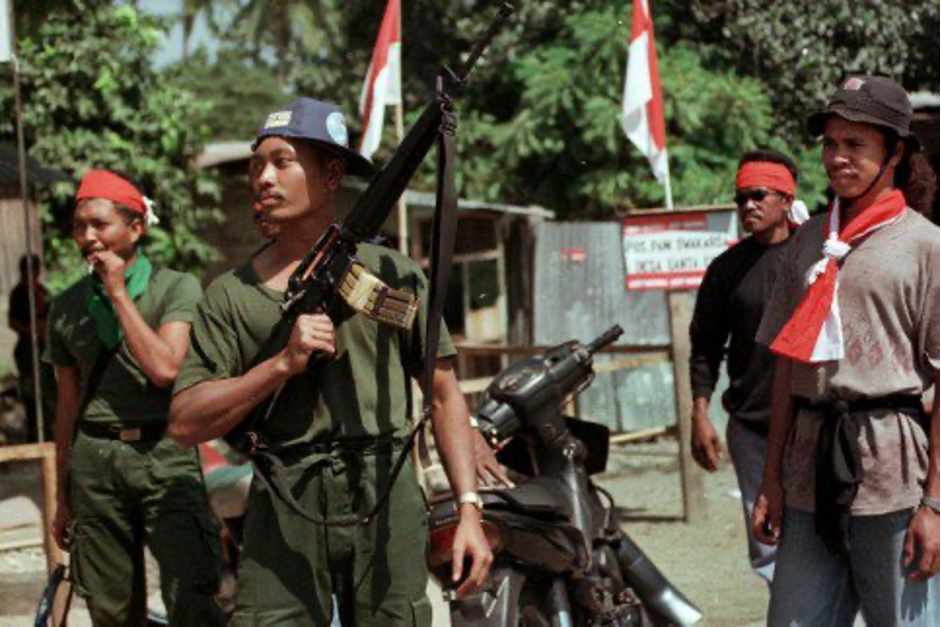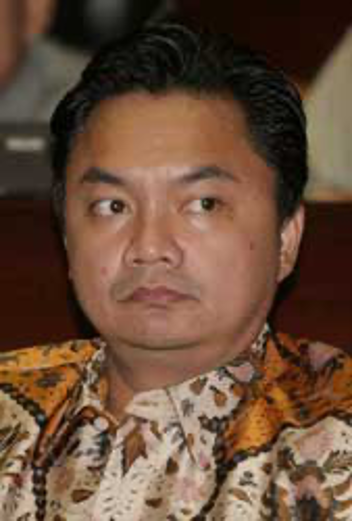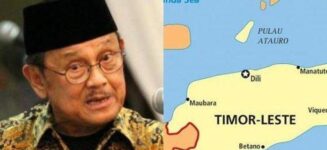A slightly different version appeared in The Jakarta Post September 21, 2010.
http://www.thejakartapost.com/news/2010/09/21/our-envoy-washington.html
History sometimes turns men and politics in unexpected places and situation. It’s an irony that a key player in Dili mayhem of 1999 has now become the new Indonesian ambassador to the US in Washington, DC.
Eleven years ago, on September 6, I999, I was lucky to have been able to take the seat of a good friend, prof. Herbert Feith, at the Merpati flight and left East Timor capital Dili for Denpasar. I was safe and freed from the bloody amok run by the Indonesian army and the militia in Dili, which began only two days earlier.
Pak Herb, thanks to his own sources, knew what’ll happen, thus left Dili days earlier. Many, however, were not that lucky. Fifteen hundreds Dili residents were slaughetered, a few escaped, and journalist Agus Muliawan, along with six Catholic sisters, were brutally murdered near Los Palos as Battalion 745 went rampage along its journey home.*)
Traumatic as they were, East Timorese will never forget the tragedy of September 1999 – despite the truth and friendship agreement (CTF) the Jakarta and Dili governments signed to close the chapter three years ago. Indeed, to this very day, many East Timorese families are still living, poor and miserable, in ex-U.N. camps in West Timor ever since hundred thousands of their compatriots were deported there by force.
Human rights atrocities should be revealed, brought to justice and serve as lessons. But what lessons can the public take from cases that were never brought to justice and instead prematurely closed for the sake of peaceful relations between the two states only?
A year ago, at the celebration of the 10th anniversary of East Timor vote, President Jose Ramos-Horta explicitly rejected international tribunal, but at the same time stressed the moral responsibilities for each of the countries involved — Timor Leste and Indonesia — each in its own way, to pursue justice. Nothing – except efforts to compensate some victims – has happened since.
Mysteries thus remain: Why did some Indonesians go home just on time i.e. before the Dili violence began on September 4? Who gave instructions for them to return home so soon? Why did this information only circulate among a few Indonesians in Dili? Was it indeed the original “Plan B” of the Army to run bloody amok soon after the negative plebiscite outcome was announced on September 4?
Indonesian media with correspondents at the military headquarter at Cilangkap were quick to order their reporters in Dili to return home. But they never revealed who informed them and why.
Interestingly, though, there were not only the KPS (Commission on Peace and Stability) mission whose job was to help control and report on peace and stability in the region, but also that of the state liaison officers, whose role, given the tensions, was even more crucial — to inform and warn the public of the possibility of violence.
A few days before the vote, I saw the KPS mission — Koesparmono Irsan, Djoko Soegijanto, B.S. Marbun of then National Commission of Human Rights — and legal expert Benyamin Mangkoedilaga relaxing at their villa at Dili shore. I also saw the laisson officiers – Gen. Zacky Anwar Makarim and Foreign Affairs’ staff Dino Patti Djalal – but what they exactly did was not clear at all.
However, when the announcement of the plebiscite drew near amid increasing tensions and confusion, all one could notice was the conspicuous absence of those very officials — the KPS and the liaisons officers — who could have informed us about the approaching violence they might already know was coming. After all, their task was to deal with the security which Indonesia according to the New York Agreement of May 5, 1999 pledged to guarantee.
Years later, as the CTF sessions went on in 2007, I had the chance to meet with the noted lawyer Benyamin Mangkoedilaga and asked the intriguing question that had disturbed me for sometime: Where were you, the KPS, when the Army run amok in Dili?
Let us recall that by then, September 4, 1999, the UNAMET (UN Assistance Mission for East Timor) staff were already held hostage by the Army’s militia. Benyamin replied that he left Dili on September 3, while his KPS colleagues along with Dino Patti Djalal departed on September 1.
“What could we do? We were instructed by the military authorities to leave the country!” Benjamin explained.
Benjamin Mangkoedilaga’s reply is particularly important for several reasons.

First, it is the first ever acknowledgment that the military was fully aware of the carnage that was about to happen, but did nothing except warn Jakarta officials and select journalists. This, indeed, implied that the military headquarter might have planned the mayhem.
Second, it indicates not only that the KPS did not complete its job, but simply released itself of its very responsibility by leaving Dili even before the turmoil began while presumably knowing about what about to happen.
Third, in doing so, both the KPS and the liaison officers have in fact ignored Jakarta’s responsibility to guarantee the security during the vote, including that for the UNAMET. Compare a similar breach of security in the case of the Bosnia Moslem killings in 1995 which resulted in international row.
In fact, it’s only a fortnight after Jakarta insisted at the U.N. to be entrusted with the security of the vote (New York, May 5, 1999) that it’s decided (Presidential Decision/Keppres No. 43, May 18, 1999), that the whole security arrangement for East Timor vote was to be organized by a special committee called the Satgas P3TT (Task Force Popular Consultation in East Timor), led by then Coordinator Minister for Politics and Security Gen. Feisal Tanjung.
It is this Satgas P3TT, which planned and was responsible for the security of the U.N. held vote, which was coordinated and represented on the spot by Gen. Zacky Anwar Makarim and political heavyweight diplomat Dino Patti Djalal.
Our man in Dili by then is now R.I. Ambassador in Washington D.C: Dino Patti Djalal – a seasoned diplomat with extensive experience in security matters, in particular on East Timor – the very place of atrocities which have led the U.S. Senate to impose sanction, the first ever, on Indonesian military.
President Barack Obama, who has shown serious interests in human rights conditions in Indonesia, will have the rare opportunity to hear Indonesia’s role and experience in organizing a bloody amok with hundreds of deaths and intimidating a U.N. institution from none other than one of its key players: Dino.
Let’s hope, to say the least, even though I very much doubt it, that he’ll get a more complete story.
The writer is a journalist.
*) Two other journalist killed during this tragic episode were the Timorese Guteres and the Dutch Sander Thoenes.



